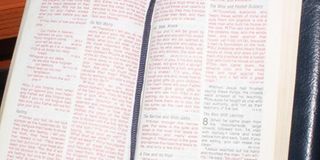A common thread unites a believer in witchcraft and the staunch atheist

The educated atheist will believe unflinchingly in the unquestioned superiority of his theory, with absolutely no evidence to support him except that he has received a modern education. FILE PHOTO | JEFF ANGOTE |
What you need to know:
- Belief: Different people will believe different things; it depends on orientation.
- The educated atheist will believe unflinchingly in the unquestioned superiority of his theory, with absolutely no evidence to support him except that he has received a modern education.
There are events, on a lazy sunny afternoon in a rural primary school, that happily disrupt a double mathematics session and send all the pupils out into the streets.
On one occasion in Maua, a town at the foot of the Nyambene ranges in Meru, we heard a din that was so loud we had to scamper out of class to investigate.
We discovered that locals had accused a man from the neighbouring Tharaka district of killing his neighbour, a local, and decided it was the solemn duty of every villager to dispatch the murderer to his judgement in the next world.
We enthusiastically joined the chase, but the man from Tharaka was very cunning. He would run around 50 metres then turn around and brandish his bow and arrow.
Now, the stereotype of the Tharaka is that they are the world’s best marksmen, and legend has it that a poisoned arrow from their quiver can be shot into the air and land, with a sure aim, right on top of your head.
So every time the suspect turned to face the crowd, we would collectively change course and run at full speed in the opposite direction.
The circus continued, with the man getting ever further away from the sword-wielding accusers leading the chase until he approached the police station.
When he got near there, he dropped his arrows, shot straight in, swept past the OB section and demanded to be arrested. His date with his maker would have to wait.
The only previous occasion in which such drama had been witnessed in town, a villager said, was the time when the arrest was ordered of Kathata, the local witchdoctor.
The villager who told the story swore that the police had been unable to get near Kathata and ultimately pleaded with him to follow them of his own volition.
When he obliged, he was followed by his cooking pot, furniture and other regalia, which all walked majestically next to him.
LIGHTS APPEARED
This (admittedly embellished) second story was brought back to me reading a recent narration by the former American talk show host Dick Cavett, who recalled a time he went to an Indian spiritual ceremony known as the “Yuwipi”
Mr Cavett wrote in the New York Times how the leader of the Indians was covered from head to toe and laid flat at the altar in a very hot room.
Sacred songs began to be played and “then they began to appear. The lights. They appeared gradually and up high, looking like light-blue ghosts of snowballs, drifting dreamily about in the air above.
“Each one’s appearance was announced by what sounded like billiard balls colliding. Though sweating, I got a chill.”
Cavett was left shaken but confused by the experience. When he confronted another American Indian friend the fellow laughed, said those things occur all the time and argued most people didn’t believe it because they had been educated into “embracing what is really the white man’s religious leap of faith — coincidence”.
MALAYSIAN AIRLINES MYSTERY
In debates on this subject of coincidence vs faith I have followed, the question that has attracted most heat is that of the mystery of the two Malaysian Airlines planes.
How could it be that one plane could vanish into thin air (probably misdirected by the pilot) and then a few weeks later, the same airline has the misfortune of its plane completely randomly taking a missile that brings it down?
Coincidence, the educated fellow will say. It’s the spirits, the believers of Kathata and the Yuwipi will argue.
The point is that the educated atheist will believe unflinchingly in the unquestioned superiority of his theory, with absolutely no evidence to support him except that he has received a modern education.
The spiritual fellow is equally convinced but lacks confidence. The point Cavett’s friend makes is that none has the right to be more confident than the other.
At least the spiritual fellow can take comfort in the words of the wag who argued, from a cost benefit perspective, that it is better to believe in something and discover after death that it was all a waste of time than to believe in nothing and get a nasty surprise later.





